- About SDG 7
- Energy-efficient renovation and building
- Upgrade buildings to higher energy efficiency
- Carbon reduction and emission reduction process
- Plan to reduce energy consumption
- Energy wastage identification
- Divestment policy
- Local community outreach for energy efficiency
- 100% renewable energy pledge
- Energy efficiency services for industry
- Policy development for clean energy technology
- Assistance to low-carbon innovation
Related Content
Seventh goal: Affordable and clean energy
Qassim University’s Contribution to SDG 7: Promoting Affordable and Clean Energy in Saudi Arabia
Sustainable Development Goal 7 (SDG 7) focuses on ensuring access to affordable, reliable, sustainable, and modern energy for all. In Saudi Arabia, country rich in energy resources, addressing energy affordability and transitioning to clean sources of energy is crucial for sustainable development. Qassim University recognizes the significance of SDG 7 and has taken proactive steps to contribute to the promotion of affordable and clean energy within its community and beyond.
Energy efficiency initiatives:
Qassim University’s commitment to SDG 7 is evident through its energy efficiency initiatives. The university implements measures to reduce energy consumption on its campus, such as upgrading lighting systems, optimizing HVAC systems, and promoting energy-saving behaviors among students and staff.
Renewable Energy Integration:
The university actively explores the integration of renewable energy sources, such as solar and wind power, into its operations. Qassim University’s efforts to harness clean energy contribute to reducing reliance on fossil fuels, lowering carbon emissions, and promoting sustainable energy practices.
Education on Sustainable Energy:
Qassim University plays a vital role in educating future professionals who will shape the energy landscape. The university offers courses and programs that cover topics related to sustainable energy sources, energy conservation, and renewable technologies. By equipping students with knowledge about clean energy, Qassim University contributes to building a skilled workforce capable of driving the transition to sustainable energy systems.
Research on Clean Energy Technologies:
The university’s commitment to SDG 7 extends to its research endeavors focused on clean energy technologies. Qassim University’s research projects explore innovative solutions for harnessing and utilizing renewable energy sources efficiently. This research contributes to advancements in clean energy technologies that can benefit the wider community.
Promotion of Energy-Saving Practices:
Qassim University promotes energy-saving practices and behavior change among students, staff, and the community. The university organizes awareness campaigns, workshops, and seminars that educate individuals about the importance of energy conservation and provide practical tips for reducing energy consumption.
Collaboration with Energy Agencies:
The university collaborates with energy agencies, research institutions, and industry partners to collectively address energy challenges and promote clean energy adoption. These collaborations facilitate knowledge exchange, technology transfer, and joint projects aimed at advancing affordable and clean energy solutions.
Demonstration Projects for Clean Energy:
Qassim University establishes demonstration projects that showcase the viability and benefits of clean energy technologies. These projects serve as practical examples for students and the community, inspiring them to consider clean energy options and contribute to a more sustainable energy future.
Sustainable Infrastructure Development:
Qassim University incorporates sustainable energy principles into its infrastructure development plans. The university considers energy-efficient design, renewable energy integration, and smart building technologies when constructing new facilities, contributing to long-term energy savings.
Qassim University’s commitment to SDG 7 is demonstrated through its proactive efforts to promote affordable and clean energy. By implementing energy efficiency measures, integrating renewable energy sources, educating students, conducting research, promoting energy-saving practices, collaborating with energy agencies, and incorporating sustainable design principles, the university actively contributes to a more sustainable energy future for Saudi Arabia. Through its dedication, Qassim University plays a crucial role in advancing the goals of SDG 7 and ensuring access to clean and affordable energy for present and future generations.
Qassim University Engineering Club discusses the role of solar energy in boosting the national economy according to Vision 2030
The Engineering Student Club at Qassim University, College of Engineering and ASME, in partnership with the Saudi Board of Engineers, organized a lecture entitled "The role of solar energy in boosting the national economy according to Vision 2030".
During his lecture, Dr. Radwan Abdulghani talked about the axes on which the vision is based on a vibrant society, a prosperous economy and an ambitious homeland, and the importance of energy in achieving the axes. This lecture came within the various programs held by the Engineering Student Club to raise the level of competence of the students of the College of Engineering and those interested in this field. The lecture met the interest of the students because of its importance and the information it contained showing the role of solar energy in Vision 2030.
For their part, a number of members of the engineering student club emphasized that the club will continue to hold lectures that will develop students and raise their efficiency in line with Saudi Arabia's Vision 2030.
The lecture was held at the College of Engineering theater in the presence of more than 120 people, including the Dean of the College of Engineering, Dr. Fahad Almufadhi, his deputies, and a number of faculty members, engineers, and students.
Director of King Fahd University of Petroleum: Benefit from the experiences of universities in developed countries Director of the Institute of Management: New mechanism to ensure access to leadership positions Zamil: We have established several community partnerships in the energy, industrial and telecommunications sectors
During the third seminar
Director of King Fahd University of Petroleum: Utilizing the experiences of universities in developed countries
Director of the Institute of Management: New mechanism to ensure access to leadership positions
Zamil: We have established several community partnerships in the energy, industrial and telecommunications sectors
Media and Communication Center:
The conference "The Role of Saudi Universities in Activating Vision 2030" continued at Qassim University, where the third session was held after the official opening ceremony of the conference, chaired by His Highness Prince Dr. Turki bin Saud bin Mohammed Al Saud, President of King Abdulaziz City for Science and Technology, under the title "Universities and Vision 2030" with the participation of His Excellency Dr. Mohammed bin Sulaiman Al Jasser, former Minister of Economy and Planning, His Excellency Dr. Khaled bin Saleh Al Sultan, President of King Fahd University of Petroleum and Minerals, His Excellency Dr. Mushbib bin Aiadh Al Qahtani, Director General of the Institute of Public Administration and Dr. Abdulrahman Al Zamel Group Chairman of the Board of Directors of Zamil Al-Qaeda Group.
Dr. Khalid bin Saleh Al-Sultan presented a working paper entitled "The Role of Saudi Universities in Activating Vision 2030, Reality and Hope." He presented the experiences of universities that were able to lead the transformation of societies and achieve the hopes of development in several developed countries, such as the contribution of the university sector to the British national product by about 40 billion pounds in one year, in addition to providing 340 thousand job opportunities through its various activities, where every one pound spent on knowledge exchange activities in British universities achieves an estimated return of 6.4 pounds, and in several developed countries such as the United States of America, Switzerland, Denmark and Canada, the same is the case in several developed countries.
Mr. Al-Sultan said that KFUPM has launched new initiatives in line with the aspirations of the vision, in addition to the quality initiatives already in place and continuing to implement them, based on promoting excellence in preparing national competencies and leaders, pioneering in water research and technologies and environmental protection, expanding the impact of the innovation and entrepreneurship system and contributing with pioneering initiatives to develop the national economy, building distinguished models of public education schools and developing the management of non-profit institutions, while diversifying the university's funding system.
His paper concluded that the implementation of the vision is important, but it is more important to have the depth and spirit of the vision, especially for universities, which global practices point to their double role in achieving what the vision aspires to, by focusing on measuring substantive achievements and tangible effects rather than relying on indicators and numbers.
Dr. Mashib bin Ayed Al-Qahtani, Director General of the Institute of Public Administration, presented a working paper on "The Role of the Institute of Administration in Achieving Vision 2030", based on enhancing the role of the Institute as a distinguished house of expertise to support institutional and administrative change and development, providing outstanding services that meet the needs of customers and achieve high levels of satisfaction, developing financial resources and increasing spending efficiency, in addition to developing a coherent, interactive and responsive work environment to build motivated, capable and empowered human resources at the Institute, which contributes to increasing its interaction and societal impact.
He also presented the initiatives of the Institute of Management in the National Transformation Program, which are: discovering and attracting future administrative leaders in the public and private sectors and qualifying them according to international best practices; developing the knowledge and skills of current leaders to keep pace with the requirements of change and transformation in the administrative, economic and technical fields; developing relevant systems and regulations to support the access of qualified people to leadership positions; and building a framework that includes organizational mechanisms that contribute to meeting the training needs of civil servants and raising their efficiency by providing intensive training courses remotely
Dr. Abdulrahman Al Zamil, Chairman of Zamil Holding Group, reviewed his organization's efforts in the field of scientific research development and the support it provides for this field. The Zamil Oasis includes a digital fabrication lab through which models for scientific projects and innovations are prepared, and a mobile scientific exhibits hall: These are exhibits that are displayed every period in one of the scientific fields and are coordinated in cooperation with international scientific centers, in addition to the Early Learning Hall: It is an integrated hall for children to practice scientific thinking skills in various ways according to educational portfolios for four scientific tracks according to a methodology STEMShe specializes in early education.
Zamil also emphasized that his holding group has established several community partnerships with several government and private entities in the field of scientific research development, in areas such as energy, oil, industry, aerospace and aviation, technology, and telecommunications.
UQU President: The National Industries Development Program contributes to transforming the Kingdom into a major industrial powerhouse
His Excellency Prof. Dr. Abdulrahman bin Hamad Al-Dawood, President of the University, affirmed that the launch of the National Industries and Logistics Development Program, which is one of the most important and largest programs of the Kingdom's Vision 2030, will contribute to transforming the Kingdom into a major industrial power that contains many industrial castles and will make it an important station on global trade routes to provide logistics services, making the most of the untapped natural resources and distinguished geographical location granted by God Almighty to our dear homeland.
He pointed out that the Custodian of the Two Holy Mosques King Salman bin Abdulaziz and His Royal Highness the Crown Prince - may Allah protect them - are leading this economic transformation to achieve Vision 2030, reducing dependence on oil as the main source of income in the Kingdom, focusing on a number of other vital sectors that are important tributaries to economic and social development, namely the industrial, mining, energy and logistics sectors, raising their contributions to GDP by more than one trillion riyals, creating more than one and a half million jobs, attracting more investments and raising the volume of non-oil exports to exceed one trillion riyals.
He added that education and scientific research will have a major role in the development, promotion and development of the industries to be established in the next stage, as the industry depends mainly on trained and qualified cadres scientifically and practically to operate these factories, and universities will have a major role in providing qualified cadres in the fields of science, engineering, mining and others, in addition to scientific research and studies that can contribute to the development of many industries and benefit from the innovations and inventions produced by research laboratories in the Kingdom's universities.
Al-Dawood explained that this blessed step confirms that the Kingdom is moving towards the future with firm steps and unrelenting determination, and that the tricks and machinations of the enemies of this great nation will not deter it from achieving its goals in a more prosperous, safe, stable and united future under the banner of unification, to ensure a better life for future generations in all fields, praying to God to guide the leadership of this dear country and its people to what is good and development, and to guide their steps and make them the pride of this homeland and its people.
Saudi Arabia begins accepting scientific abstracts for its international conference on "Solar Energy Prospects in the Kingdom"


The University, represented by the College of Engineering, has announced the start of receiving scientific abstracts for the international conference "Solar Energy Prospects in the Kingdom of Saudi Arabia: Applications and Challenges", which will be held on April 1-2, 2020, and the university invited researchers wishing to participate in this international conference to send abstracts of scientific research, via the conference link; the abstracts will be received until October 31, 2019, and the accepted abstracts will be announced on November 15, 2019.
The conference aims to invite leading academics, researchers in solar energy applications and industry experts in Saudi Arabia and the world to exchange experiences, challenges and results, in addition to promoting and developing promising solar energy technologies to support and achieve the Kingdom's Vision 2030, as well as contributing to the realization of the Kingdom's Vision 2030 objectives in diversifying the current oil-based economy to transform the Kingdom from an advanced oil exporting country to a sustainable energy exporting country.
For his part, the head of the scientific committee of the conference, Dr. Meshaal Al-Mashaigh, Dean of the College of Engineering, explained that this conference is held in line with the 2030 vision of the Kingdom of Saudi Arabia, which aims to support the national economy, reduce dependence on oil, and create awareness of the importance of solar energy as an abundant source of renewable energy in the Kingdom of Saudi Arabia, as the conference covers the current situation and developments in solar energy technologies and applications, including, for example: Solar thermal, photovoltaic and solar architecture, pointing out that the conference will focus on the use of solar engineering in various applications within the academic, governmental and industrial communities in Saudi Arabia, and benefit from previous experiences in this vital field.
He added that the conference will discuss a number of topics, including solar power generation, solar energy storage, solar desalination, solar heating and cooling applications, passive and active applications of solar energy on buildings, as well as solar energy applications in transportation and its management in the Kingdom of Saudi Arabia.
Solar Energy Horizons conference discusses ways to utilize solar energy for desalination and electricity generation
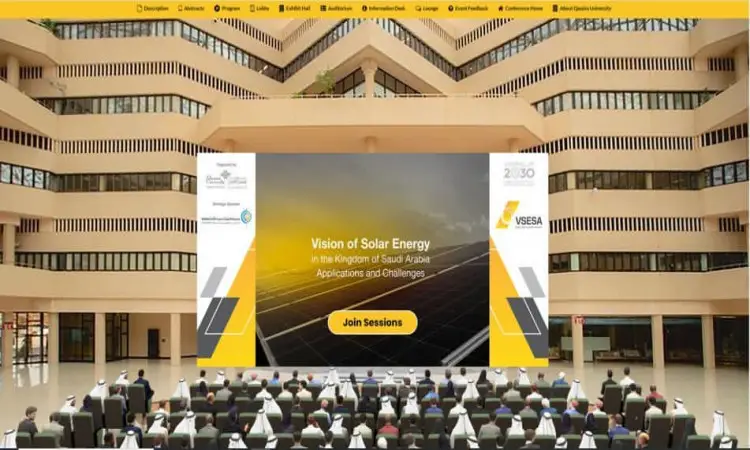
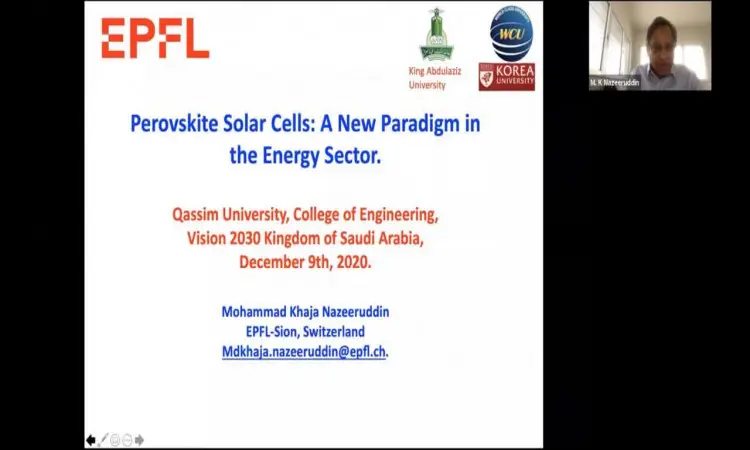
The scientific sessions of the international conference "Prospects of Solar Energy in the Kingdom of Saudi Arabia: Applications and Challenges" organized by the University, represented by the College of Engineering, on its first day yesterday, Wednesday 24/4/1442 AH, discussed a number of themes, research and scientific studies with the participation of many academics and researchers in solar energy applications and industry experts in the Kingdom of Saudi Arabia and the world remotely.
The first scientific session of the conference was held under the title "Solar Power Generation", where Dr. Emad Shams presented a paper titled "Identifying the solar maximum power tracking issue using swarm dynamics inspired algorithms", during which he discussed methods of tracking the solar maximum power point to make the photovoltaic system in optimal operation, taking into account the costs, then Dr. Ahmed Eid spoke on "The impact of distributed solar power generation on power loss and voltage stability for distribution networks Dr. Ahmed Eid then presented his paper titled "Impact of Distributed Solar Power Generation on Power Loss and Voltage Stability of Distribution Networks", in which he discussed the integration of distributed solar generators with distribution networks to reduce active power loss and enhance voltage stability.
Then, Dr. Hamid Mohammed presented a paper titled "Evaluation of crystalline silicon PV module operating conditions for frequency distribution for the city of Riyadh", during which he emphasized that PV module performance varies under external field conditions and can be better analyzed using frequency distribution under different operating conditions, as the purpose of this study was to find the most common operating conditions for PV modules that can be used for planning, designing and sizing PV power plants, Dr. Rupmati Meena spoke about his paper titled "Degradation of Crystalline Silicon Photovoltaic Modules under Hot Climatic Conditions". "Degradation of crystalline silicon PV modules under hot climate conditions", in which he revealed that crystalline silicon PV modules are prone to defects and degradation under hot climate conditions such as in desert areas that suffer from multiple environmental stresses, high temperature, UV radiation, along with changing temperature and humidity with gas ingress, where these stress factors can lead to structural, mechanical, thermal and chemical changes within the PV module that affect its electrical performance.
Then Dr. Manahil Mohammed spoke with a paper entitled "Solar energy as an alternative to electrical energy in Saudi Arabia's Vision 2030", during which she addressed the opinion of the Saudi people on the use of solar energy as an alternative to electrical energy in homes. The researchers applied a questionnaire containing 216 samples from different segments of society, and the questionnaire contains four parts, and when the sample was asked about the need to use renewable energy sources to generate electricity instead of generation from oil derivatives, 88.8% of the sample agreed, and when asked about the most appropriate source of renewable energy sources for investment in Saudi Arabia, they agreed.
At the end of the session, Dr. Hisham Osman presented his paper titled "Thermal characteristics of a parabolic trough collector (comparative study)." He emphasized that parabolic troughs are the most advanced CSP technology, as operating temperatures in the range of 350-550°C can be achieved in parabolic troughs, and parabolic trough solar power plants can produce from 5 to 280 MW.
The scientific sessions of the conference continued through a session entitled "Desalination using solar energy", where Dr. Qazi Bari spoke about his research entitled "Porous column type solar desalination unit", in which he addressed the sources of high-quality potable water that are rapidly diminishing in many urban and rural areas of the world, especially in the Middle East, Africa and Asia for many reasons, and the removal of salinity and impurities in raw water by any traditional method is still expensive, so the researcher and decision makers tried all possible cost-effective alternatives, and one low-cost method to produce
Then, Dr. Zakaria Amara spoke about his study titled "Solar distillation with a rotating wheel for desalination: He explained that the back wall of the distillery is not exploited and through it a large heat loss occurs, so a metal disk was installed on a horizontal shaft that rotates by an electric motor, and the rotating disk is located in the middle of the back wall and this increases the area of evaporation and the area of exposure to solar radiation, when the disk rotates, it gets wet with a thin layer of water, which helps speed up evaporation, then Dr. Abdullah Naguib spoke about his research entitled "Solar desalination using multi-effect membrane distillation: This work addressed the performance of a solar desalination system using the membrane distillation process. This system consists of solar photovoltaic panels, solar thermal collectors and a membrane distillation unit, the latter is based on multiple-effect membrane distillation in which the thermal energy is recycled and reused in the system when the cooling in the condenser is turned on.
In turn, Dr. Abdulkader Abdullah presented a research entitled "The effect of adding trays on the performance of solar distillation, an experimental approach." The productivity of solar desalination units is proportional to the depth of water and the wetted surface area inside the unit, the productivity of the unit can be increased by increasing the surface area of the basin, to maintain the minimum possible depth of water inside the unit we used shelves, and two desalination units were designed and manufactured, the first unit of the traditional type and the second modified unit with shelves, and research experiments for the modified desalination unit were designed, manufactured and conducted for the purpose of improving the productivity of the modified desalination unit. In addition, it was designed according to safety standards, and the goal of this work is to increase the productivity of fresh water by some changes in the design of the unit, where we obtained an increase in the productivity of the racked desalination unit by approximately 45% compared to the conventional unit, and the daily efficiency was 47% and 34% for the racked desalination unit and the conventional unit, respectively.
The first day of the conference concluded with a scientific session titled "Materials used in solar energy applications", which witnessed the participation of Dr. Nazek Al-Attab with a paper titled "Ultra-flexible, stretchable, lightweight and highly efficient silicon solar cells for unmanned aerial vehicles." The study emphasized that the demand for unmanned aerial vehicles is increasing significantly due to their wide range of applications including, but not limited to, agricultural inspection, firefighting and border security, as well as current drones that run on electricity, but if they are equipped with solar energy technology
Dr. Rupmati Meena, presenting his paper titled "Investigation of different types of defects in newly manufactured crystalline silicon photovoltaic modules", said that solar photovoltaic cells have recently become a promising renewable energy technology, and solar energy is being utilized all over the world. However, photovoltaic cells face many manufacturing stage defects even before actual use, and these defects not only affect the performance of the cells, but are likely to cause severe performance degradation within a few years of field operation After that, Dr. Sadek spoke about a research paper entitled "Design, fabrication and testing of low-cost flat panel collectors under the climate of central Qassim", during which he emphasized that energy is the main basis for economic, technical and social development, and with the increasing global awareness of energy challenges, solar energy has been given great attention as a promising solution to energy issues, and in this research a small-sized, naturally circulating, low-cost solar collector with a solar receiving aperture of 0. 75 square meters was designed and fabricated in this research.The solar collector was tested to heat 20 liters of water during the day in the city of Unaiza from October 18 to November 4. 75 square meters at the College of Engineering in Unaiza, Qassim University, and the collector was tested to heat 20 liters of water during the day.
At the end of the session, Dr. Mohamed Moussa presented "AMX3 Inorganic Metal Halide Perovskite as Promising Candidate Materials for Future Photovoltaic Solar Cell Technologies", during which he emphasized that since the first appearance of photovoltaic solar cells in 1976, many scientists have directed tremendous efforts to improve the performance and efficiency of conventional photovoltaic solar cells, and a range of inorganic semiconductors have been used to manufacture photovoltaic solar cells For his part, Dr. Mohammed bin Rabahah spoke about his paper titled "Silicon Nanowires for Photovoltaic Applications," noting that chemical etching based on silver nanoparticles is a modern and very advanced method used to form nanowires on the surface of single-crystalline silicon wafers.
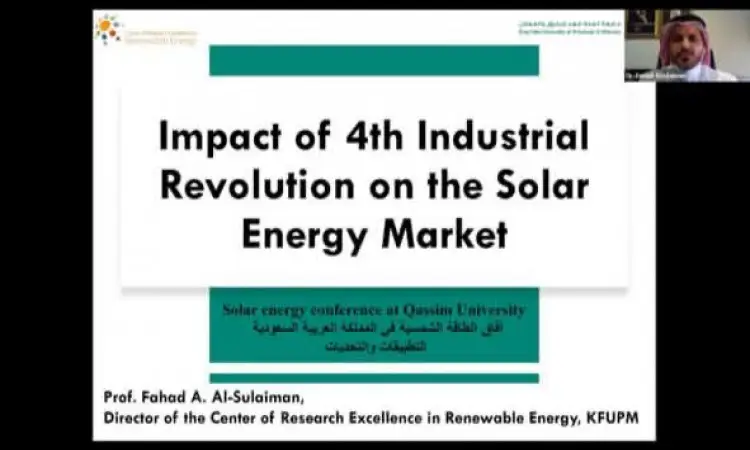
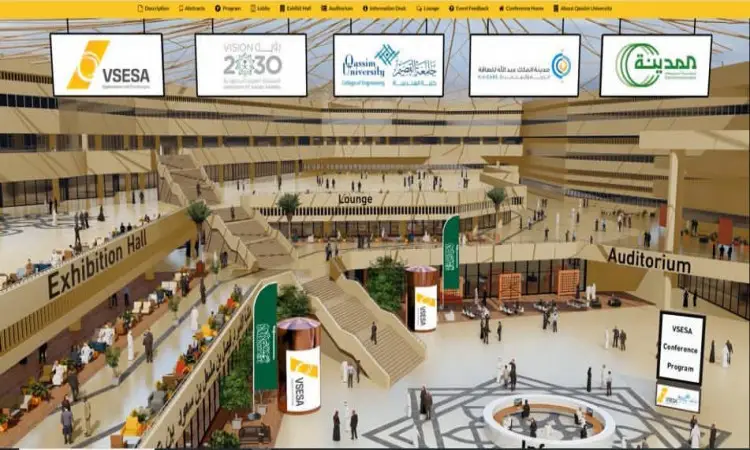
UQU President inaugurates the First International Conference on Sustainability of Natural Resources
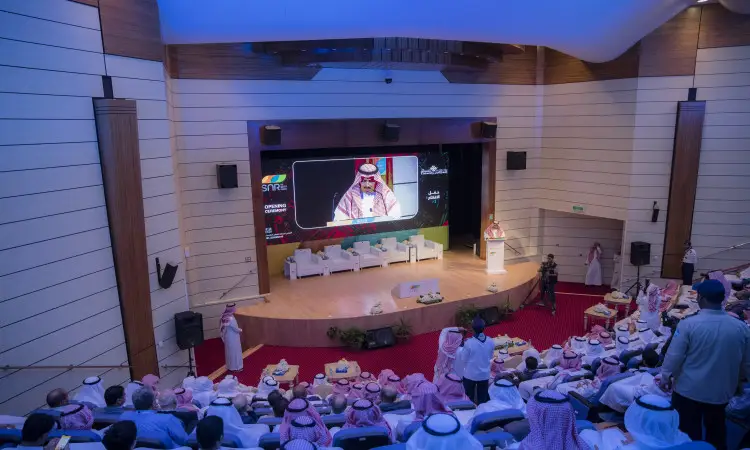
His Excellency Prof. Dr. Abdulrahman bin Hamad Al-Dawood, President of the University, stressed that achieving environmental sustainability is one of the most important pillars of the Kingdom's Vision 2030, in order to raise the efficiency of waste management and reduce pollution, as the Kingdom is an active member of the international system, especially the G20, which seeks to achieve the UN Sustainable Development Goals, pointing out that the issue of waste management is related to a number of UN goals, including industry, innovation, infrastructure, sustainable cities, sustainable production and consumption, as well as reducing climate change.
This came during the UQU President's patronage of the First International Conference on Sustainability of Natural Resources: Sustainable Solid Waste Management, which was launched on Tuesday morning, 8/3/1441 AH, organized by the University College of Engineering and the Center for Sustainable Development, at the main lobby of the University City for men, and for women at the theater of the College of Economics and Administration, over two days with the participation of 36 speakers to cover all the themes and objectives of this scientific meeting, which aims to discuss the necessary measures to shift to sustainable food systems.
Al-Dawood added that the university seeks to achieve sustainability through its centers, research and scientists, through a system of integration and cooperation between its units, educational and research programs, thanking the sponsors of the conference, the Municipality of Qassim, and all contributing sectors inside and outside the university.
The UQU President also inaugurated the exhibition accompanying the conference, in which 6 governmental and private entities participated, including the corner of the Qassim Municipality, a corner of the College of Engineering, a corner of the Sustainable Development Center, a corner of the City Cement Company, the Cleaning Machinery Factory Limited, and Al-Fahad Company.
For his part, Prof. Khaled Bani Al-Harbi, Vice President for Planning, Development and Quality, spoke about the importance of this conference, which comes in line with the university's sense of its strategic role in the Kingdom in general and the region in particular, and embodies the Kingdom's aspirations emanating from its Vision 2030, which gives great importance to the economic and quality of life fields, pointing out that the university has adopted a number of academic activities to embody this role, most importantly this type of scientific meetings, in addition to supporting research in this field and including sustainability concepts in the courses of academic programs, and recently
"Al-Harbi" added: The Organizing Committee held more than 12 lengthy meetings to prepare for the conference, while the meetings of the other executive committees exceeded more than 30 working meetings, 19 of which were for the scientific committee, and the preparatory team's working hours reached more than 150 working hours, and the working team included more than 36 members, and this work resulted in the participation of more than 15 countries with 168 participants, and more than 120 scientific research papers were judged.
Al-Harbi explained that the organizing committee and those in charge of this conference, which dedicates to sustainability as a concept and research through participants and interested parties, decided to go beyond this conference to be sustainable even in its organizational printer, extending thanks and appreciation to the partners of success represented by the strategic partner Medina Cement Company, silver sponsor Al-Fahad Company, supporting sponsor Qassim Municipality, and the cooperating parties with the conference, in particular the Ministry of Environment, Water and Agriculture represented by the Environment Agency and the Ministry's branch in the region represented by His Excellency Engineer Salman Al-Suwaina, and the General Department of Education in the region represented by His Excellency Professor H.E.
After that, the Dean of the College of Engineering, Dr. Meshaal bin Ibrahim Al-Mashaigah, said that the College of Engineering at the university attaches great importance to the topics of sustainability of natural resources due to its specialized nature, so that the college is one of the most important arms of the university to achieve this noble purpose alongside the relevant specialized bodies from other colleges and units, the most important of which is the Center for Sustainable Development at the university, as a partner in organizing and incubating the conference with the college in holding this qualitative international forum.
The conference aims to show the size of wasted natural and economic resources and estimate the environmental cost of waste, as well as discuss the necessary measures to shift to sustainable food systems in which waste is minimized and food waste is reduced, in addition to stimulating integration between partners from different disciplines for sustainable waste management, studying opportunities to stimulate investment in the field of developing waste recycling technologies in the Kingdom, and studying the obstacles to investment in the field of waste conversion industries, through several themes discussed by the conference, namely: Effective management, valued food and responsible citizens, attractive and ambitious investment, and a cohesive team for environmental protection and sustainability.
The organizers of the conference seek to contribute to the preparation of a vision on sustainable solid waste management at the national and international level, through the participation of a number of experts, academics and specialists from 15 countries in this field and discuss the results of the latest studies, research and scientific papers related to sustainable solid waste management through 6 sessions over the two days of the conference, in order to reduce the per capita consumption rates in Saudi Arabia of some goods and services, which are among the highest rates globally, increasing the volume of solid waste generated and reducing the depletion of natural resources and their deterioration due to consumption rates.
The Dean of the College of Engineering added that the conference also seeks to address the challenges arising from waste, which is the responsibility of every member of society, raise community awareness of the risks arising from waste generation, encourage initiatives aimed at improving sustainable waste management, and provide an opportunity to exchange experiences and knowledge among specialists in waste management and sustainable development.
Then, the speech of the sponsors was delivered by the Executive Director of City Cement, Mr. Majed bin Abdulrahman Al-Asilan, in which he stressed the existence of millions of tons of municipal waste, estimated at billions of riyals, which contains organic and inorganic materials, including food and blessings that God has blessed this blessed country with and other materials that could have been recycled and transformed into energy to achieve added value to the nation. Unfortunately, they end up in landfills, which is a type of waste and contradicts our Islamic values and teachings, in addition to the negative environmental effects resulting from the dumping of waste into the ground, some of which need more than 100 years to decompose in nature.
He pointed out that most of the developed European countries, such as Germany, the Netherlands and Belgium, the amount of waste that goes to landfills is almost zero, as no waste is landfilled, and if necessary, very high fees are paid for landfilling to limit these practices and protect the environment, by replacing the use of petroleum fuels with renewable energy and alternative fuels. He extended his sincere thanks and appreciation to all colleagues at the university and the organizers of this conference for their blessed efforts and for their contribution to achieving the directives of our wise government in raising awareness about the environment and sustainability, supporting coordination between the public and private sectors, and contributing to the realization of the Kingdom's Vision 2030 to put the Kingdom in the ranks of developed countries.
For his part, the Director of the Center for Sustainable Development, Mr. Ibrahim bin Saleh Al-Rubadi, spoke about the vision of the Center for Sustainable Development at the university for sustainability through a balanced and integrated approach to achieve fair development between regions and generations, each taking his right and each doing his duty towards his environment, society and economy to complete the three clusters of sustainability, and sustainability addresses waste in its physical, technical, social, technical, informational, financial and economic dimensions.
Al-Rabdi explained that waste management is linked to a number of UN goals, especially the ninth goal, which is industry, innovation and infrastructure, the eleventh goal related to sustainable cities, the twelfth goal related to sustainable production and consumption, and the thirteenth goal, which is concerned with reducing climate change. We hope that this conference seeks to accurately diagnose the issues and develop appropriate solutions by the scientists and experts gathered, and we hope that the objectives of this conference will be realized and its recommendations translated into useful practical projects
The conference was attended by UQU Vice President Dr. Mohammed Al-Saawi, UQU Vice President for Educational Affairs Dr. Mohammed Al-Obayeb, UQU Vice President for Postgraduate Studies and Scientific Research Prof. Ahmed Al-Turki, Engineer Salman Al-Suwaina, Director of the Ministry of Environment, Water and Agriculture Branch in Qassim, Mr. Saleh Al-Jasser, Director of the Education Department in Qassim, Engineer Abdul Mohsen Al-Furaihi, Director of the Water Directorate in Qassim, Engineer Abdulaziz Al-Salim, Deputy Secretary of Qassim Region, college deans, faculty members and students at the university.
References
[1] [Online]. Available: .https://www.qu.edu.sa/content/news/392
[2] [Online]. Available: .https://www.qu.edu.sa/content/news/413
[3] [Online]. Available: .https://www.qu.edu.sa/content/news/1135
[4] [Online]. Available: .https://www.qu.edu.sa/content/news/1444
[5] [Online]. Available: .https://www.qu.edu.sa/content/news/2389
[6] [Online]. Available: .https://www.qu.edu.sa/content/news/2395
[7] [Online]. Available: .https://www.qu.edu.sa/content/news/1531
- About SDG 7
- Energy-efficient renovation and building
- Upgrade buildings to higher energy efficiency
- Carbon reduction and emission reduction process
- Plan to reduce energy consumption
- Energy wastage identification
- Divestment policy
- Local community outreach for energy efficiency
- 100% renewable energy pledge
- Energy efficiency services for industry
- Policy development for clean energy technology
- Assistance to low-carbon innovation
